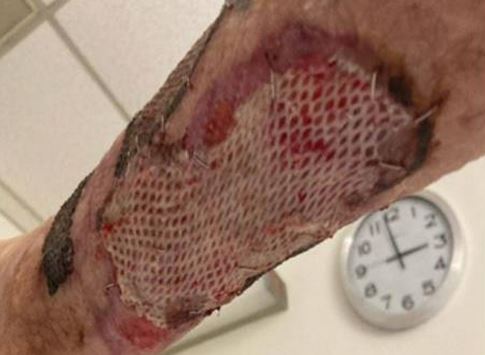Dermacell Allograft - Cadaver Skin
About
- Donated skin from another human
- Facilitates cell proliferation and migration
- Retains native growth factors, collagen, and elastin critical for wound healing
- Can bridge to grafting or primary patient healing; may be left on permanently
Appearance
- Net-like, pale yellow or white
- Resembles a skin graft
Dressing Frequency
- Change every 5-7 days typically
- May increase based on drainage and wound appearance
Dressing Care
- Careful removal to avoid lifting Dermacell
- Inspect the graft and cleanse with Vashe
- Gently pat dry
- Moisturize with wound gel, bacitracin, or gentamicin (as per provider preference)
- Apply non-adherent layer (Mepitel + Adaptic), then cover with ABD and Kerlix
- Important: DO NOT USE SILVADENE
Troubleshooting
- Replace dressing if it slides off or graft is exposed
- If Dermacell looks dry, apply copious wound gel and notify provider
- Call if there’s increased pain, inflammation, purulent/green drainage, or odor
Lifestyle Considerations
- Avoid strain on the graft site to prevent disruption
- Encourage a diet rich in proteins, vitamins, and minerals for healing
- Discuss adding Juven wound healing supplement with provider
- Use Steri Strips to secure in place; often stapled to surrounding skin

Most times stapled to surrounding skin

Steri Strips to secure in place
